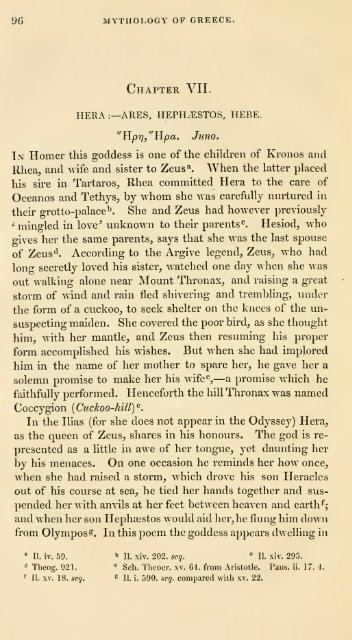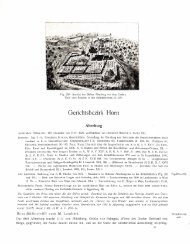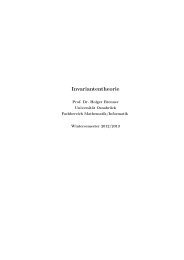- Page 2:
^Trt« of PR'A'Cf?^ Logical se^€>
- Page 6 and 7:
THE PLATES ETCHED ON STEEL, By W. H
- Page 8 and 9:
iv PREFACE. more confidence. It is
- Page 10 and 11:
VI PREFACE. The subjects of the pla
- Page 12 and 13:
Vlll PREFACE. proprietors, some of
- Page 14 and 15:
was, we find, a favourite one with
- Page 16 and 17:
X CONTENTS. CHAP. X. PALLAS-ATHENE
- Page 18 and 19:
Xll CONTENTS. CHAP. X. MYTHES OF EL
- Page 20 and 21:
Xlv PLATES. Plate V. 1. Aphrodite a
- Page 22 and 23:
XVI REFERENCES. EDITIONS REFERRED T
- Page 24 and 25:
2 MYTHOLOGY OF GREECE. its princes
- Page 26 and 27:
4 MYTHOLOGY OF GREECE. and the ligh
- Page 28 and 29:
MYTHOLOGY OF GREECE. pestilence its
- Page 30 and 31:
S MYTHOLOGY OF GREECE. rose is ascr
- Page 32 and 33:
10 MYTHOLOGY OF GREECE. honest fish
- Page 34 and 35:
12 MYTHOLOGY OF GREECE. talis Comes
- Page 36 and 37:
. 14 MYTHOLOGY OF GREECE. to its tr
- Page 38 and 39:
16 MYTHOLOGY OF GREECE. Chapter II.
- Page 40 and 41:
18 MYTHOLOGY OF GREECE. knowledge o
- Page 42 and 43:
20 MYTHOLOGY OF GREECE. mysteries c
- Page 44 and 45:
22 MYTHOLOGY OF GREECE. was the Sac
- Page 46 and 47:
24 MYTHOLOGY OF GREECE. of the Chur
- Page 48 and 49:
26 MYTHOLOGY OF GREECE. the Nature
- Page 50 and 51:
28 MYTHOLOGY OF GREECE. these were
- Page 52 and 53:
30 MYTHOLOGY OF GREECE. Violet-bed
- Page 54 and 55:
32 MYTHOLOGY OF GREECE. The Greeks
- Page 56 and 57:
34 MYTHOLOGY OF GREECE. the scenes
- Page 58 and 59:
36 MYTHOLOGY OF GREECE. In the time
- Page 60 and 61:
38 MYTHOLOGY OF GREECE. place to wh
- Page 62 and 63:
40 MYTHOLOGY OF GREECE. place of re
- Page 64 and 65:
42 MYTHOLOGY OF GREECE. and Hesiod
- Page 66 and 67:
44 MYTHOLOGY OF GREECE. Nereus had
- Page 68 and 69:
46 MYTHOLOGY OF GREECE. him. The Cy
- Page 70 and 71: 48 MYTHOLOGY OF GREECE. productive
- Page 72 and 73: 50 MYTHOLOGY OF GREECE. Chapter IV.
- Page 74 and 75: 52 MYTHOLOGY OF GREECE. This is all
- Page 76 and 77: 54 MYTHOLOGY OF GREECE. are told, i
- Page 78 and 79: 56 MYTHOLOGY OF GREECE. Neither Hom
- Page 80 and 81: 58 MYTHOLOGY OF GREECE. ance of bei
- Page 82 and 83: 60 MYTHOLOGY OF GREECE, XeXijvT]. L
- Page 84 and 85: 62 MYTHOLOGY OF GREECE. In the Home
- Page 86: 64 MYTHOLOGY OF GREECE. described a
- Page 90 and 91: 66 MYTHOLOGY OF GREECE. others said
- Page 92 and 93: 68 MYTHOLOGY OF GREECE. Kpovo? koX
- Page 94 and 95: 70 MYTHOLOGY OF GREECE. mother coul
- Page 96 and 97: 72 MYTHOLOGY OF GREECE. Chapter V.
- Page 98 and 99: 74 MYTHOLOGY OF GREECE. pour forth
- Page 100 and 101: 76 MYTHOLOGY OF GREECE. purtenances
- Page 102 and 103: 78 MYTHOLOGY OF GREECE. Chapter VI.
- Page 104 and 105: 80 MYTHOLOGY OF GREECE. tised; Zeus
- Page 106 and 107: 82 MYTHOLOGY OF GREECE. we shall gi
- Page 108 and 109: 84 MYTHOLOGY OF GREECE. lightning,
- Page 110 and 111: 86 MYTHOLOGY OF GREECE. in their ni
- Page 112 and 113: 88 MYTHOLOGY OF GREECE. with the wa
- Page 114 and 115: 90 MYTHOLOGY OF GREECE. of the most
- Page 116 and 117: 92 MYTHOLOGY OF GREECE. dead who wa
- Page 118 and 119: 94 MYTHOLOGY OF GREECE. to conceal
- Page 123 and 124: HERA. 9f peace and harmony with Let
- Page 125 and 126: HERA. 99 in spring-time producing v
- Page 127 and 128: HERA. 101 In Boeotia the popular my
- Page 129 and 130: HERA. 103 bits no symptoms of becom
- Page 131 and 132: ARES. 105 Terror and Fear (Ae^to? a
- Page 133 and 134: ARES. 107 and Tereus. He was also s
- Page 135 and 136: HEPHAESTOS. 109 other substance tha
- Page 137 and 138: HEBE. Ill It was apparently to brin
- Page 139 and 140: PHCEBOS-APOLLO. H3 these deities ma
- Page 141 and 142: PHtEBOS-APOLLO. 115 lyre and a bow,
- Page 143 and 144: PHCEBOS-APOLLO. 11^ who he is, and
- Page 145 and 146: PHCEBOS-APOLLO. Ill) Of this legend
- Page 147 and 148: PHCEBOS-APOLLO. 121 when flung by A
- Page 149 and 150: PHCEBOS-APOLLO. 123 parts of the Il
- Page 151 and 152: PHCEBOS-APOLLO. 125 of the Grecian
- Page 153 and 154: PHCEBOS-APOLLO. 127 been the destro
- Page 157 and 158: ARTEMIS, The Homerids have also sun
- Page 159 and 160: ARTEMIS. 131 We have already notice
- Page 161 and 162: ARTEMIS. 133 her, but seeing no cha
- Page 163 and 164: ARTEMIS. 135 the coast a ; and it b
- Page 165 and 166: ARTEMIS', 137 and moon, it is alleg
- Page 167 and 168: APHRODITE. 139 Chapter IX. DIONE -.
- Page 169 and 170: APHRODITE. 141 heavenly origin, and
- Page 171 and 172:
APHRODITE. 143 that the goddess cha
- Page 173:
PMeM4
- Page 176 and 177:
14G MYTHOLOGY OF GREECE. "Epo?, "E/
- Page 178 and 179:
148 MYTHOLOGY OF GREECE. who was ju
- Page 180 and 181:
150 MYTHOLOGY OF GREECE. the rock o
- Page 182 and 183:
152 MYTHOLOGY OF GREECE. The interp
- Page 184 and 185:
154 MYTHOLOGY OF GREECE. Pallas-Ath
- Page 186 and 187:
156 MYTHOLOGY OF GREECE. with them,
- Page 188 and 189:
158 MYTHOLOGY OF GREECE. any other
- Page 190:
160 MYTHOLOGY OF GREECE. mortals. T
- Page 194 and 195:
162 MYTHOLOGY OF GREECE. he slunk h
- Page 196 and 197:
164 MYTHOLOGY OF GREECE. her, singi
- Page 198 and 199:
166 MYTHOLOGY OF GREECE. footpaths,
- Page 200 and 201:
168 MYTHOLOGY OF GREECE. the cattle
- Page 202 and 203:
170 MYTHOLOGY OF GREECE, Chapter XI
- Page 204 and 205:
away to be his queen ; : MYTHOLOGY
- Page 206 and 207:
174 MYTHOLOGY OF GREECE. In the mor
- Page 208 and 209:
176 MYTHOLOGY OF GREECE. were added
- Page 210 and 211:
178 MYTHOLOGY OF GREECE. tinually f
- Page 212 and 213:
180 MYTHOLOGY OF GREECE. 2. Terribl
- Page 214 and 215:
182 MYTHOLOGY OF GREECE. the worshi
- Page 216 and 217:
184 MYTHOLOGY OF GREECE. person was
- Page 218 and 219:
186 MYTHOLOGY OF GREECE. Later ages
- Page 220 and 221:
1S8 MYTHOLOGY OF GREECE. back; and
- Page 222 and 223:
190 MYTHOLOGY OF GREECE. almost eve
- Page 224 and 225:
192 MYTHOLOGY OF GREECE. Xdpires. G
- Page 226 and 227:
194 MYTHOLOGY OF GREECE. Eileithyia
- Page 228 and 229:
196 MYTHOLOGY OF GREECE. Night and
- Page 230 and 231:
198 MYTHOLOGY OF GREECE. Chapter XI
- Page 232 and 233:
200 MYTHOLOGY OF GREECE. which suit
- Page 234 and 235:
202 MYTHOLOGY OF GREECE. NeyLtecrt?
- Page 236 and 237:
204 MYTHOLOGY OF GREECE. and flung
- Page 238 and 239:
206 MYTHOLOGY OF GREECE. where Diom
- Page 240 and 241:
208 MYTHOLOGY OF GREECE. on board ;
- Page 243 and 244:
DIONYSOS. 209 Supposing therefore D
- Page 245 and 246:
DIONYSOS. 211 that country by colon
- Page 247 and 248:
DIONYSOS. 213 Hermes to convey to I
- Page 249 and 250:
DIONYSOS. 215 nature. It therefore
- Page 253 and 254:
DIONYSOS. 217 upwards of forty of h
- Page 255 and 256:
DIONYSOS. 219 in Grecian mythology.
- Page 257 and 258:
: FOREIGN DEITIES. 221 any literary
- Page 259 and 260:
FOREIGN DEITIES. CYBELE. 223 of the
- Page 261 and 262:
COTYS AND BENDIS. 225 and the myste
- Page 263 and 264:
ISIS. 227 mysteries were among the
- Page 265 and 266:
pan. 229 Chapter XVI. RURAL DEITIES
- Page 267 and 268:
PAN. 231 attained to such distincti
- Page 271 and 272:
SATYRS. 233 and they portrayed him
- Page 273 and 274:
SILENOS. PRIAPOS. 235 origin of thi
- Page 275 and 276:
NYMPHS. 237 Nv/jL(j>cu. Nymphce. Ny
- Page 277 and 278:
NYMPHS. 239 plants a . In the Homer
- Page 279 and 280:
NYMPHS. 211 Is any here ? and Echo
- Page 281 and 282:
NYMPHS. 243 being the inventor of t
- Page 283 and 284:
TRITON. 245 NyprjiSes. Nereides. Th
- Page 285 and 286:
PROTEUS. 247 Egypt, and he and his
- Page 287 and 288:
LEUCOTHEA AND PAL^MON. 249 the Argo
- Page 289 and 290:
HESPERIDES. 251 Chapter XVIII. DEIT
- Page 291 and 292:
gorgoxs. 25.3 of Agamemnon a ; and
- Page 293 and 294:
as birds or as the blasts of wind a
- Page 295 and 296:
HOMERIC GEOGRAPHY. 257 Chapter XIX.
- Page 297 and 298:
CYCLOPES. 259 A(0TO(f)d>yoi. Lotoph
- Page 299 and 300:
CYCLOPES. 261 elopes in general, bu
- Page 301 and 302:
^olos. 263 Athena flung the isle of
- Page 303 and 304:
LAESTRYGONIANS. 265 their king was
- Page 305 and 306:
CIRCE. 267 she struck them with her
- Page 307 and 308:
CIRCE. SIRENS. 2G9 but we cannot he
- Page 309 and 310:
SIRENS. SCYLLA AND CHARYBDIS. 27l b
- Page 311 and 312:
PHAETHUSA AND LAMPETIA. 273 wished
- Page 313 and 314:
CALYPSO. PHiEACIANS. 275 isle of Ca
- Page 315 and 316:
PHAEACIANS. 277 abode of Rhadamanth
- Page 317 and 318:
ORTYGIA AND SYRIA. 279 homewards du
- Page 319 and 320:
MYTHOLOGY OF GREECE. Part II.—THE
- Page 321 and 322:
AGES OF THE WORLD. 283 black iron w
- Page 323 and 324:
AGES OF THE WORLD. 285 be regarded
- Page 325 and 326:
IAPETOS, ATLAS, MENCETIOS. 287 tien
- Page 327 and 328:
PROMETHEUS AND EP1METHEUS. 289 In H
- Page 329 and 330:
PROMETHEUS AND EPIMETHEUS. 291 lege
- Page 331 and 332:
PANDORA. 293 clients, lords and vas
- Page 333 and 334:
PANDORA. 295 have understood the wo
- Page 335 and 336:
DEUCALION AND PYRRHA. 297 that he s
- Page 337 and 338:
DEUCALION AND PYRRHA. 299 Deucalion
- Page 339 and 340:
EARLY INHABITANTS OF GREECE. 301 ev
- Page 341 and 342:
EARLY INHABITANTS OF GREECE. 303 le
- Page 343 and 344:
EARLY INHABITANTS OF GREECE. 305 li
- Page 345 and 346:
IASON AND MEDEIA. 307 husband. It w
- Page 347 and 348:
IASON AND MEDEIA. 309 cated the Arg
- Page 349 and 350:
IASON AND MEDEIA. 311 be only anoth
- Page 351 and 352:
PELEUS AND ACHILLEUS. 313 Peleus fo
- Page 353 and 354:
ixion. 315 usage of the heroic ages
- Page 355 and 356:
CENTAURS AND LAPITIIS. 3l7 the Cent
- Page 357 and 358:
CEYX AND HALCYONE. 319 Kr/vl; koI '
- Page 359 and 360:
CENEUS. MELEAGROS. 321 god's famili
- Page 361 and 362:
CENEUS. MELEAGROS. 323 their nation
- Page 363 and 364:
CADMOS. Chapter IV. MYTHES OF BCEOT
- Page 365 and 366:
CADMOS. 327 lyrians, and had a son
- Page 367 and 368:
SEMELE. AUTONOE, ARISTVEOS, AND ACT
- Page 369 and 370:
AUTONOE, ARISTiEOS, AND ACTION. 331
- Page 371 and 372:
INO AND ATHAMAS. 333 famine might b
- Page 373 and 374:
AGAUE AND PENTHEUS. 335 in the Pryt
- Page 375:
2ETMV9 AMTftQPE t, m% oft?* ^ v ^Mr
- Page 378 and 379:
338 MYTHOLOGY OF GREECE. Tone-full,
- Page 380 and 381:
340 MYTHOLOGY OF GREECE. Aai'o?. La
- Page 382 and 383:
342 MYTHOLOGY OF GREECE. foot after
- Page 384 and 385:
344 MYTHOLOGY OF GREECE. nymph Char
- Page 386 and 387:
346 MYTHOLOGY OF GREECE. tained the
- Page 388 and 389:
348 MYTHOLOGY OF GREECE. married, a
- Page 390 and 391:
350 MYTHOLOGY OF GREECE. ture, and
- Page 392 and 393:
352 MYTHOLOGY OF GREECE. cause of t
- Page 394 and 395:
354 MYTHOLOGY OF GREECE. was suffoc
- Page 396 and 397:
35G MYTHOLOGY OF GREECE. ing at tha
- Page 398 and 399:
358 MYTHOLOGY OF GREECE. tomb of Ab
- Page 400 and 401:
360 MYTHOLOGY OF GREECE. Being scor
- Page 402 and 403:
362 MYTHOLOGY OF GREECE. been affli
- Page 404 and 405:
364 MYTHOLOGY OF GREECE. The hero h
- Page 406 and 407:
366 MYTHOLOGY OF GREECE. ravaged Co
- Page 408 and 409:
3G8 MYTHOLOGY OF GREECE. the city o
- Page 410 and 411:
370 MYTHOLOGY OF GREECE. and being
- Page 412 and 413:
372 MYTHOLOGY OF GREECE. men, desce
- Page 414 and 415:
3/"4 MYTHOLOGY OF GREECE. earth), c
- Page 416 and 417:
37^ MYTHOLOGY OF GREECE. Sais in Lo
- Page 418 and 419:
378 MYTHOLOGY OF GREECE. Kpavaos. C
- Page 420 and 421:
380 MYTHOLOGY OF GREEGE. vering the
- Page 422 and 423:
382 MYTHOLOGY OF GREECE. tracted by
- Page 424 and 425:
384 MYTHOLOGY OF GREECE. Here we fi
- Page 426 and 427:
3$6 MYTHOLOGY OF GREECE. he receive
- Page 428 and 429:
388 MYTHOLOGY OF GREECE. to punish
- Page 430 and 431:
390 MYTHOLOGY OF GREECE. tarily off
- Page 432 and 433:
392 MYTHOLOGY OF GREECE. Theseus wa
- Page 434 and 435:
394 MYTHOLOGY OF GREECE. the fall.
- Page 436 and 437:
396 MYTHOLOGY OF GREECE. Peloponnes
- Page 438 and 439:
398 MYTHOLOGY OF GREECE. AaiSaXos z
- Page 440 and 441:
400 MYTHOLOGY OF GREECE. charged hi
- Page 442 and 443:
402 MYTHOLOGY OF GREECE. the virtuo
- Page 444 and 445:
404 MYTHOLOGY OF GREECE. cord with
- Page 446 and 447:
406 MYTHOLOGY OF GREECE. principal
- Page 448:
408 MYTHOLOGY OF GREECE. firmation
- Page 452 and 453:
410 MYTHOLOGY OF GREECE. The countr
- Page 454 and 455:
412 MYTHOLOGY OF GREECE. the person
- Page 456 and 457:
414 MYTHOLOGY OF GREECE. with lepro
- Page 458 and 459:
416 MYTHOLOGY OF GREECE. dusa as it
- Page 460 and 461:
418 MYTHOLOGY OF GREECE. the sea-we
- Page 462 and 463:
420 MYTHOLOGY OF GREECE. forms a pa
- Page 464 and 465:
422 MYTHOLOGY OF GREECE. tryon, put
- Page 466 and 467:
424 MYTHOLOGY OF GREECE, Chapter VI
- Page 468 and 469:
426 MYTHOLOGY OF GREECE. afterwards
- Page 470 and 471:
428 MYTHOLOGY OF GREECE. their head
- Page 472 and 473:
430 MYTHOLOGY OF GREECE. who had lo
- Page 474 and 475:
432 MYTHOLOGY OF GREECE. honours of
- Page 476 and 477:
434 MYTHOLOGY OF GREECE. Chapter X.
- Page 478 and 479:
436 MYTHOLOGY OF GREECE. answering
- Page 480 and 481:
438 MYTHOLOGY OF GREECE. 'Ia/u-o?.
- Page 482 and 483:
440 MYTHOLOGY OF GREECE. was origin
- Page 484 and 485:
442 MYTHOLOGY OF GREECE. TdvraXos.
- Page 486 and 487:
444 MYTHOLOGY OF GREECE. gods, they
- Page 488 and 489:
446 MYTHOLOGY OF GREECE. of the who
- Page 490 and 491:
448 MYTHOLOGY OF GREECE. but the re
- Page 492 and 493:
450 MYTHOLOGY OF GREECE. probably t
- Page 494 and 495:
452 MYTHOLOGY OF GREECE. for relief
- Page 496 and 497:
454 MYTHOLOGY OF GREECE, Chapter XI
- Page 498 and 499:
456 MYTHOLOGY OF GREECE. cording to
- Page 500 and 501:
458 MYTHOLOGY OF GREECE. In the The
- Page 502 and 503:
460 MYTHOLOGY OF GREECE. dren, migh
- Page 504 and 505:
462 MYTHOLOGY OF GREECE. beauty are
- Page 506 and 507:
4G4 MYTHOLOGY OF GREECE. IlAetaSe?
- Page 508 and 509:
466 MYTHOLOGY OF GREECE. are someti
- Page 510 and 511:
4G8 MYTHOLOGY OF GREECE. Chapter XI
- Page 512 and 513:
470 MYTHOLOGY OF GREECE, Dolionians
- Page 514 and 515:
4/2 MYTHOLOGY OF GREECE. was in the
- Page 516 and 517:
474 MYTHOLOGY OF GREECE. the island
- Page 518 and 519:
4f6 MYTHOLOGY OF GREECE. Libya, and
- Page 520 and 521:
478 MYTHOLOGY OF GREECE. Tydeus, an
- Page 522 and 523:
480 MYTHOLOGY OF GREECE. Bato, were
- Page 524 and 525:
482 MYTHOLOGY OF GREECE. of three o
- Page 526 and 527:
484 MYTHOLOGY OF GREECE. lestial st
- Page 528 and 529:
486 MYTHOLOGY OF GREECE. Aphrodite
- Page 530 and 531:
488 MYTHOLOGY OF GREECE. surroundin
- Page 532 and 533:
490 MYTHOLOGY OP GREECE. marries He
- Page 534 and 535:
492 MYTHOLOGY OF GREECE. Cassandra
- Page 536 and 537:
494 MYTHOLOGY OF GREECE. that Paris
- Page 538 and 539:
496 MYTHOLOGY OF GREECE. to the tak
- Page 540 and 541:
498 MYTHOLOGY OF GREECE. war. Again
- Page 543 and 544:
MYTHOLOGY OF ITALY. Chapter I. INTR
- Page 545 and 546:
EARLY STATE OF ITALY AND ROME. 503
- Page 547 and 548:
LATIN RELIGION. 505 casting the lig
- Page 549 and 550:
ITALIAN RELIGION. 507 turnus and Lu
- Page 551 and 552:
JOVIS, JUPF1TER, JUPITER. 509 Chapt
- Page 553 and 554:
JUNO. 511 Pistor, whose altar was o
- Page 557 and 558:
VESTA. 513 care a . She was the dei
- Page 559 and 560:
VENUS. 515 field ; the swains all f
- Page 561 and 562:
LIBER. Liber. 517 The name of the a
- Page 563 and 564:
APOLLO. MAMEBS, MAVORS, MARS. 519 A
- Page 565 and 566:
DIANA. JANUS. 521 cessor ; and he a
- Page 567 and 568:
JANUS. SATURNUS. 523 simple origin
- Page 569 and 570:
OPS. TELLUS. GENIUS. 525 Good Godde
- Page 571 and 572:
ORCUS, DITIS OR DIS. SOL AND LUNA.
- Page 573 and 574:
CONSUS. LAVERNA. 529 temple were so
- Page 575 and 576:
SUMMANUS, VEJOVIS, SORANUS. 531 asc
- Page 577 and 578:
MATUTA, AURORA. FORTUNA. BONUS EVEN
- Page 579 and 580:
TERMINUS. 535 another account says,
- Page 581 and 582:
FAUNUS. LUPERCUS. INUUS. 537 prayer
- Page 583 and 584:
the rustics leaped thrice through t
- Page 585 and 586:
VACUNA. MARICA. 541 name is now har
- Page 587 and 588:
PENATES. LARS. 543 The rivers, such
- Page 589 and 590:
LARS. 545 were hung on them, and of
- Page 591 and 592:
APPENDIX. A. Page 34. The Hyperbore
- Page 593 and 594:
APPENDIX. 549 akin to ydXa, ydXaicr
- Page 595 and 596:
APPENDIX. 551 'A/xfipotjit) is plai
- Page 597 and 598:
APPENDIX. 553 embassy. Why should h
- Page 599 and 600:
APPENDIX. 555 Ovd' dv reXeias xpvae
- Page 601 and 602:
INDEX OF NAMES. 8 V The Latin Names
- Page 603 and 604:
Daedalos, 398, 456 Damastes, 388 Da
- Page 605 and 606:
Lichas, 369 Licymnios, 421 Ligeia,
- Page 607 and 608:
Quinqudtrus, 513 Quirinus, 528 Rhad
- Page 609 and 610:
WORKS BY THE SAME AUTHOR. HISTORIES
- Page 611 and 612:
— WORKS BY THE SAME AUTHOR. VIII.

















